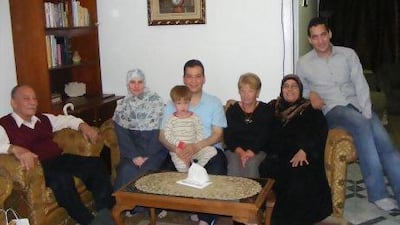CAIRO // More than seven years after an Egyptian biochemist was wrongly accused of being the mastermind behind the 2005 suicide attacks in London, his life remains in limbo from the stigma of that association.
Magdy El Nashar, 40, became tangled up in an international security alert when he unwittingly helped rent a flat in Leeds, England, where he was studying for his doctorate, to 19-year-old Jermaine Lindsay before leaving on a six-week holiday to Cairo. Two weeks later, on July 7, Lindsay was one of four suicide bombers who blew themselves up in attacks they planned on the London Underground and a double-decker bus that killed 52 passengers.
Police said the flat was used as a bomb-making lab and began a global manhunt, suspecting Mr El Nashar was the brains behind the operation.
Mr El Nashar said he was arrested because his mobile number was found on Lindsay's phone. He said he was introduced to Lindsay through mutual friends who thought he could help find him a flat.
In the ordeal that followed, he was interrogated, jailed in isolation and, even though his name was eventually cleared by police, banned from most travel because his name remains on an Egyptian government blacklist.
He and his family have tried to move on with their lives and have applied to immigrate from Egypt to Australia. But the stigma of the wrongful association seems to haunt the family, whose immigration application was sent to national security last year. Mr El Nashar has yet to receive an answer, which he attributes to the false accusations.
Mr l Nashar and his wife, a British convert to Islam, are also struggling financially because the travel ban has limited his career opportunities. However, he has secured some work as an associate professor.
"I'm not achieving what I'd like to achieve with my career and its stressful financially," said Mr El Nashar, who now has three young children all born in Egpyt. "We're struggling."
While his role in the London attacks was just a footnote, he is haunted by the experience.
Mr El Nashar was arrested on July 14, 2005, a week after plainsclothes police took him from a Cairo mosque where he was praying.
"They took me away in their car, I had no idea where they were taking me and I couldn't speak. When I asked where they were taking me they put a blindfold over my face and told me not to speak again," Mr El Nashar said.
He only realised the extent of the trouble he was in when the interrogators turned on a television, which showed footage of crowds in London carrying banners with his name and photo. "When they told me what was happening, I said 'it is impossible'," he said.
"All I saw was people on the street holding photos of me with awful names, saying I'm a monster and things like 'the beast' and 'gang leader'."
Threatened with the death penalty if found guilty, Mr El Nashar was bombarded with questions from a host of interrogators.
"They didn't do anything physically wrong, but mentally it was really, really hard," he said. "It was inhuman the way they treated me, it was very humiliating and the way they questioned me made me feel it was the end of my life."
He said the interrogators repeatedly accused him of trying to evade their questions and called him a terrorist, banning him from calling a lawyer or his family.
Two days later, he was transferred to an isolation cell where he spent the remainder of his 28 days in a Cairo prison with little outside contact.
"At one point I gave up hope and thought to myself: 'I know many people jailed in Egypt for many years without knowing the reason and I thought I'd be just another one of them. I might as well forget about a future'," Mr El Nashar said.
At one point, he was told the British investigation had cleared him of all charges but he was not released for another five days.
"I thought now the Egyptian authorities would let me go, but the next day nothing happened and I thought, 'I'm going to die here'," he said.
Egypt's prisons, under the regime of Hosni Mubarak, were notorious for holding prisoners believed to be connected with or part of radical Islamist groups without charges for many years.
In 2010, human-rights groups estimated that there were more than 10,000 people in detention, some of whom had been held for over a decade.
Even after his release, officials from London's Scotland Yard visited him in Cairo and at one point requested DNA samples from him to prove he was not involved in the bombings.
In a 2010 letter Mr El Nashar received confirmation from Scotland Yard that his DNA was "not found on any item that is designated as significant to the investigation. It is fully accepted that you had no criminal role within the investigation and became unwittingly involved without any knowledge as to what was to take place."
It became clear that the connection to Lindsay was nothing more that one neighbour helping another find a flat, he said.
"If you Google my name now all you see are these headlines related to the terrorist attacks and of course employers see this," he said.
"When I was released one journalist asked me a question which has stuck in my mind: 'Are you being punished just for helping someone?' Actually, that's what it feels like it."

